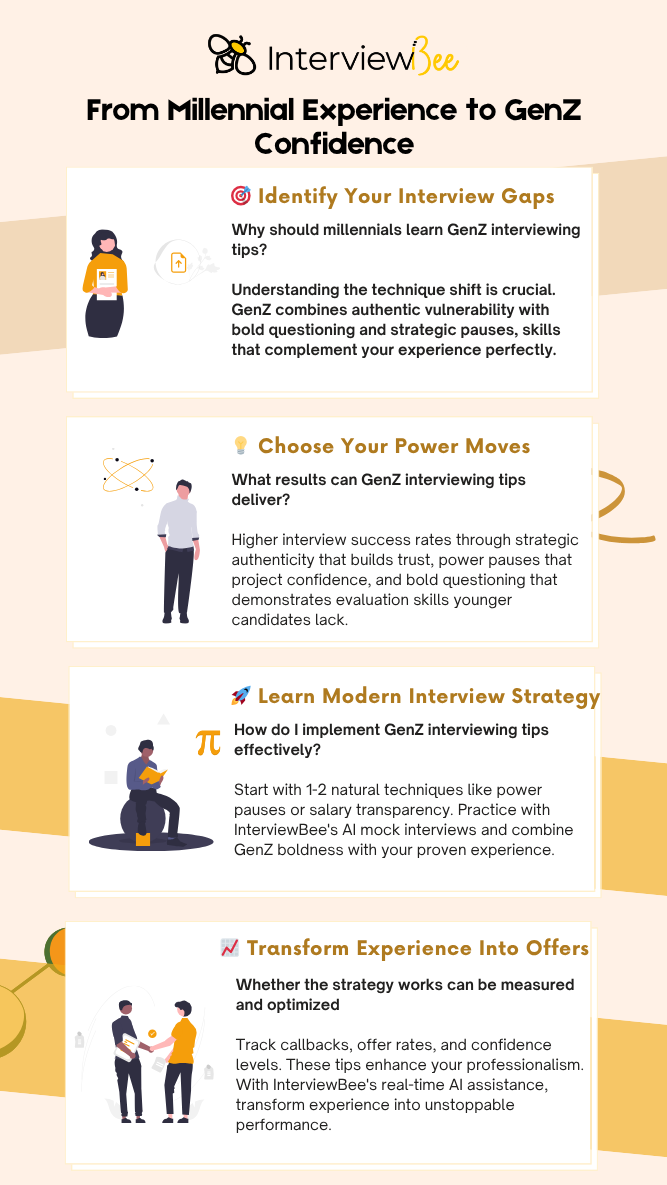
GenZ Interviewing Tips Millennials Need to Know in 2025
- Author: Anindita Ghosh
- Published On: Oct 1, 2025
- Category:Interview Guide
You spent hours perfecting your resume. You researched the company. You practiced your answers until they sounded natural. You walked into that interview with ten years of solid experience, but you didn't know the GenZ interviewing tips that actually matter in 2025.
And then you lost the job to someone fresh out of college.
It's not just you. Across industries, hiring managers are choosing GenZ candidates over more experienced millennials at rates we haven't seen before. The reason isn't what you think. It's not about age discrimination or cheaper labor costs. It's about their interviewing technique.
GenZ has completely rewritten the playbook while most of us were still perfecting the old one. They're not better candidates, they're just playing a different game. And once you understand these GenZ interviewing tips, you'll realize most of them aren't even that hard to adopt.
The Authenticity Shift That Changed Everything
Remember when we millennials entered the workforce talking about "bringing your whole self to work" and "authentic workplace culture"? GenZ actually does it.
While you're still polishing your answers to sound professional, they're telling interviewers about their weaknesses in the first ten minutes.
Here's what that looks like in practice: A hiring manager asks about leadership experience. Your instinct is to pull out your best STAR-method story about that time you successfully led a cross-functional team through a challenging project. You've rehearsed it. It's good.
The GenZ candidate in the next interview says: "I'm honestly still developing my leadership skills. I've been taking online courses and recently started mentoring junior team members to build that experience. I know I'm not where I want to be yet, but I'm deliberate about getting there."
Seventy percent of GenZ candidates proactively address their weaknesses this way, according to recent hiring data. And it works because it does something your polished story doesn't: it builds trust.
When you admit what you're working on, hiring managers believe everything else you say. Your perfect answers start to sound rehearsed by comparison.
You have something they don't, actual experience. This GenZ interviewing tip of strategic vulnerability combined with your track record makes you almost impossible to pass up.
Questions That Flip the Power Dynamic
The most jarring difference in how GenZ interviews isn't what they answer. It's what they ask.
You've been trained to save your questions for the end, right? And when you do ask them, they're safe: "What does success look like in this role?" or "Can you tell me about the team structure?"
Good questions. Professional questions. Forgettable questions.
GenZ candidates are asking about company values, mental health support, and diversity initiatives in the first fifteen minutes of the interview. Not at the end. Not tentatively. They're asking these questions like they're conducting their own evaluation of whether the company is good enough for them.
"How does your organization actually support employee wellbeing?" That's not a closing question anymore. It's an opening move.
The first time you hear this approach, it sounds almost aggressive. But here's what it actually does: it positions the candidate as someone evaluating a mutual fit rather than someone desperate for approval.
It demonstrates confidence. It makes the interviewer work a little bit to sell them on the opportunity.
You might think this is risky. But consider what message your safe questions send: you're grateful to be considered. Their bold questions send a different message: they're considering multiple options.
The beauty of this interviewing technique for millennials is that you can back up those bold questions with substance. When you ask about company culture, you can follow up with, "In my last role, I saw firsthand how important these factors are for team performance." This millennials job interview strategy combines experience with confidence.
You're not just asking, you're demonstrating that you know what matters because you've already experienced what happens when it's missing.
The Two-Second Pause That Projects Authority
GenZ has mastered something deceptively simple: the power pause. When asked a difficult question, they take two full seconds before answering.
Not a quick breath. Two deliberate seconds of silence.
Try it right now. Ask yourself a question and count: "one-Mississippi, two-Mississippi." It feels like an eternity, doesn't it? In an interview, it feels even longer.
But here's what happens in those two seconds: you stop looking nervous. Silence, when it's controlled, reads as thoughtfulness rather than hesitation. It gives you time to formulate a better answer. And it trains the interviewer to wait for quality responses from you.
Most millennials fill silence with "um," "well," or "that's a great question", verbal fillers that make you sound uncertain. GenZ just pauses. The difference in perceived confidence is remarkable.
This might be the easiest GenZ interviewing tip to steal because it requires no preparation. Just permission to be silent.
The next time someone asks you a challenging question, count to two before you speak. Watch how it changes the entire dynamic of the conversation.
Want to practice this interviewing technique before your next real interview? InterviewBee's AI Mock Interviewer simulates realistic interview pressure with adaptive questioning, so you can train yourself to pause naturally instead of rushing to fill silence. The AI adjusts its follow-ups based on your responses, just like actual interviewers do.
Technology as Your Competitive Edge, Not Your Weakness
Here's an uncomfortable truth: GenZ isn't more tech-savvy than you. They just use technology more strategically in their interview preparation.
They're using AI tools to practice mock interviews with instant feedback. They're recording themselves and analyzing their body language. They're studying their interviewer's LinkedIn profile not just for small talk, but to understand what that person values and how to speak their language.
You've been treating interview prep like it's still 2015, researching the company website, maybe looking at Glassdoor reviews, running through questions in your head.
Meanwhile, they're simulating realistic interview scenarios with AI that mimics how actual interviewers respond to their answers.
The technology gap isn't about age. It's about willingness to use tools that didn't exist when you learned how to interview.
And here's your advantage: once you start using these tools, you combine AI-powered preparation with real-world interview experience they don't have. That's a lethal combination.
Here's what modern interview prep actually looks like: Use InterviewBee's Mock AI Interviewer to practice answering questions specific to your role and experience level. The AI asks contextual follow-ups based on your resume and the job description, just like real interviewers do. You get performance analytics showing exactly where you're strong and where you need work.
Then, during the actual interview, if you get hit with an unexpected question, InterviewBee's Live AI Assistant provides real-time talking points in under 2 seconds, completely undetectable, even during screen sharing. Think of it as having an expert coach whispering in your ear, except it's AI analyzing the question and your background to generate relevant responses.
The technology exists. The question is whether you're going to use it or keep interviewing like it's 2015.
The Salary Conversation They're Not Afraid to Have
This might be the most important technique to understand: GenZ talks about money early and directly.
Fifty-five percent of GenZ workers negotiate their compensation, and 44% of them receive higher offers as a result. Compare that to millennials, most of whom were taught to wait until you have an offer before discussing salary, and even then, to be grateful rather than demanding.
The GenZ approach looks like this: When asked about salary expectations in the first or second interview, they give a clear range based on market research and then explain why they're worth it.
No hedging. No "I'm flexible." Just: "Based on my research and the scope of this role, I'm looking for something in the $85,000 to $95,000 range."
Your first instinct might be that this is too aggressive, that it could cost you the opportunity. But think about what actually happens: Either the company's range aligns with yours (and you just saved everyone three interviews' worth of time), or it doesn't (and you just avoided wasting weeks on an opportunity that was never going to work out).
You have something most GenZ candidates don't: you can tie your salary expectations directly to your proven track record. "In my last role, I increased revenue by 30%, and I'm looking for compensation that reflects that level of impact" is a much stronger position than "I'm worth X because Glassdoor says so."
The key is timing and framing. You're not demanding anything. You're having a professional conversation about mutual expectations that creates powerful negotiation leverage.
Adaptability as Your Primary Selling Point
GenZ has figured out something crucial: in a rapidly changing work environment, learning agility matters more than static expertise. So instead of trying to prove they know everything, they focus on proving they can learn anything.
This is where you might be making your biggest mistake. You're probably walking into interviews emphasizing your ten years of experience in X technology or Y process. That sounds impressive until the interviewer wonders whether you can adapt to their newer systems.
GenZ candidates talk about how quickly they picked up three different project management tools in their last role. "How they taught themselves a programming language over a weekend when a project needed it". "How they're constantly taking courses and adapting to new environments".
Your experience is valuable, but only if you frame it correctly. Instead of "I have ten years of experience with this specific tool," try: "I've mastered four different versions of this type of tool over my career, including the current one you're using. When systems change, I'm usually the person training everyone else."
See the difference? Same experience, different framing. One sounds like someone stuck in the past. The other sounds like someone who's been successfully adapting for years. This millennials job interview approach makes all the difference.

Bringing It All Together
The job market hasn't suddenly become ageist. It's become technique-ist. GenZ isn't winning because they're younger. They're winning because they've figured out how to interview in a way that addresses what modern employers actually care about: authenticity, confidence, adaptability, and cultural fit.
Your advantage is that you don't have to choose between GenZ interviewing tips and your experience. You can combine both for superior millennials job interview performance.
You can be strategically vulnerable about your growth areas while backing it up with a decade of proven results. You can ask bold questions and then demonstrate why you're qualified to evaluate the answers. You can talk about learning agility while proving you've been adapting successfully for years.
The next time you prepare for a millennials job interview, try this: Instead of rehearsing perfect answers to standard questions, practice being more honest about your development areas. Instead of saving your questions for the end, plan three bold questions you'll ask in the first fifteen minutes.
Instead of rushing to fill the silence, practice power pausing before your responses. Instead of avoiding salary conversations, research market rates and prepare to discuss them confidently.
And instead of preparing alone the way you did in 2015, use the tools that exist now.
Try InterviewBee free to practice with AI mock interviews that adapt to your responses, get real-time assistance during live interviews, and receive performance analytics that show you exactly where you're strong and where you need work. No credit card required to start.
GenZ didn't invent confidence or authenticity. They just figured out how to demonstrate both in an interview setting. And now that you understand these GenZ interviewing tips, you can deploy them with something they don't have yet: proof that you've actually done the job.
The question isn't whether you're qualified. You are. The question is whether you're willing to interview like someone who knows it.


